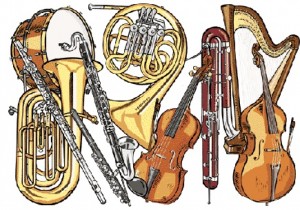
We (Edith Hope Fine and Judith Josephson) are the Grammar Patrol. Both of us taught for years and are now writers, with thirty plus books between us, including our two popular grammar guides, Nitty-Gritty Grammar and More Nitty-Gritty Grammar. For close to twenty years, we taught writing and grammar basics and now we blog about grammar for writers.
We see collective nouns every day—nouns for persons, animals, or things that act as a single unit.
- As winter nears, flocks of birds fly south.
- A coven of witches roams on Halloween.
- Bipsy’s new litter of kittens mewls.
- The cast was stellar in tonight’s play.
- The jury is still out.
In a newspaper profile we wrote, we described our charismatic subject as “about as subtle as a fluorescent yellow Porsche in a bevy of beige Buicks.” She called, laughing when the article came out: “This is the Porsche speaking.”
Check out this bevy of collective nouns:
choir, assembly, tribe, audience, band, class, committee, corps, couple,crew, crowd, faculty, flock, group, jury, couple, majority, nation, pair, panel, press, series, set, company, family, team, crowd, school
Collective nouns used to describe a group of animals include covey, herd, pack, team, swarm, catch, and even murder! (a murder of crows.) Some of these describe more than one type of animal—a herd of cattle or wild horses.
You’ll usually see a prepositional phrase with a plural object follow the collective noun.
• A pod of whales swam past.
• A gaggle of geese milled about the yard.
• A covey of partridges roosts for the night.
• A pride of lions rests on the hill.
So what do collective nouns have to do with grammar? They can be a bit tricky. Will you pair them with a singular or a plural verb?
Collective Nouns and Singular Verbs
Collective nouns usually take singular verbs. To check your verb form, substitute the singular pronoun “it” for the collective noun.
• The faculty votes tomorrow. (It votes . . .)
• The crew dances a jig. (It dances . . .)
• The Hughes family travels often. (It travels . . .)
• The panel has released its findings. (It has released . . . )
Tip: Corporations act like collective nouns, even if the company’s name is plural. While a specific company may have many employees, refer to it as a single entity:
• Pfizer manufactures Lipitor, a cholesterol drug.
• Brinkley Brothers sells lottery tickets.
Collective Nouns and Plural Verbs
If Here’s where things can get thorny. If members of a group act as individuals, not as a unit, use a plural verb.
• The panel of doctors were not of one mind. (Each doctor had a different opinion.)
• The class begin their science experiments today. (They separate experiments.)
Collective Nouns That Measure
With collective nouns such as majority, number, percent, and total, let the words that follow and the meanings of the sentences help you decide whether the verb is singular or plural.
When what follows is singular:
- Your total number is fifty-two. (number is . . . )
- Twenty-one percent of the class fails the test. (class fails . . .)
When what follows is plural:
- Half of the tables are occupied. (tables are . . .)
- Fifty percent of the books are paperback. (books are . . .)
- The majority of new cars have GPS capability. (cars have . . .)
Grammar Questions?
Collectively speaking, that’s it from the Grammar Patrol. Keep an eye out for gaggles of honking Canadian geese or herds of cows that wander onto the highway! When you have grammar questions, consult our zany Nitty-Gritty Grammar and More Nitty-Gritty Grammar guides or write to us here. Next month, time for your annual year-end pop quiz.

 Isn’t dangling for earrings, bungee jumpers, or grapes on the vine?
Isn’t dangling for earrings, bungee jumpers, or grapes on the vine? Take a moment to think of soothing music. In a symphony orchestra, some instruments, like second violins and bass violins, are workhorses. They do their jobs and follow the rules. But some all-stars take the spotlight. Oboes sound that pivotal “A” for tuning. Trumpets announce themselves. Ta-da!
Take a moment to think of soothing music. In a symphony orchestra, some instruments, like second violins and bass violins, are workhorses. They do their jobs and follow the rules. But some all-stars take the spotlight. Oboes sound that pivotal “A” for tuning. Trumpets announce themselves. Ta-da! In Perfect Grammar Land, you’d hear, “Put out a BOLO for a blue station wagon, license ISPKGOOD.” We want you to put out a BOLO on agreement bloopers when prepositions pair with incorrect pronouns. Such errors abound, especially in speech and on TV and radio shows.
In Perfect Grammar Land, you’d hear, “Put out a BOLO for a blue station wagon, license ISPKGOOD.” We want you to put out a BOLO on agreement bloopers when prepositions pair with incorrect pronouns. Such errors abound, especially in speech and on TV and radio shows.